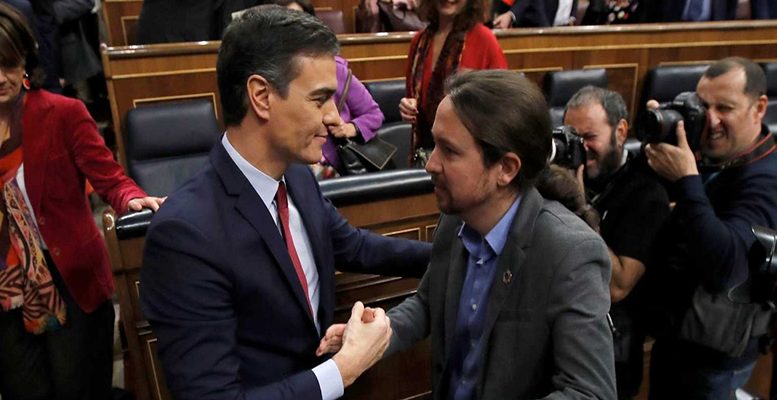Ana Fuentes | Spain will no longer be an exception in Europe: it will also have a coalition government, the first of its democracy, between the Socialist Party and the extreme left of United Podemos.
After eight months of institutional blockade and five elections, Pedro Sánchez was appointed president on Tuesday by a narrow margin in Congress: 167 votes in favor, 165 against and 18 abstentions. The abstention of the Catalan secessionists of ERC is the one that will condition him the most. The Spanish socialists will start a dialogue table on the situation of Catalonia with ERC, whose leaders are part of Catalan politicians in prison or escaped from justice for declaring independence after calling an illegal referendum in 2017.
This government is facing the biggest constitutional crisis of Spanish democracy. ERC will seek to obtain authorization to hold a referendum of self-determination in Catalonia, something that would require a constitutional reform for which the Government does not have the necessary votes in Congress.
With almost half of the parliament against, in addition to criticism within his own party, Sanchez has launched an all or nothing bet. If he manages to take a part of Catalan pro-independence parties to the constitutional path, and ERC renounces unilateralism as Basque separatism did, this will be an achievement for posterity. But the play may go wrong for the Socialists, and it would not be the first time. During the second Spanish republic, ERC declared unilaterally the independence of Catalonia, after having allied and committed to the other parties to establish a new regime.
The new executive is born with three vice-presidencies (two for the Socialists, including that of Nadia Calviño, a credibility stamp before the European institutions), but politically weak. Spain has no experience in coalition governments and the two political formations are progressive but have many differences. The social agenda unites them, but it is not easy to have the capacity to execute, to pass a budget.
The key challenge to guarantee a certain stability in the legislature will be to pass the budget. The Ministry of Finance must develop one that increases spending and revenues, through a series of tax reforms that would guarantee a minimum tax of 15% on corporate tax (up to 18% for financial institutions and hydrocarbon companies). An increase of two points in the personal income tax is expected for annual income of more than 130,000 euros, and up to four points for those who exceed 300,000 euros, representing 0.4% of taxpayers.
The government also intends to repeal certain aspects of the labor reform approved by the previous conservative government of the Popular Party, reindexing pensions with inflation, renouncing the sustainability factor and implementing a digital rate and financial transactions. All these measures, however, will have a reduced impact in the short term on economic growth and the public deficit, as the Swiss bank UBS notes in a report.
Despite some market fears, the PSOE and Podemos coalition program does not include “explicit changes” in regulations on banking, energy and public service sectors. In the same report, UBS expects a “limited” impact on the Ibex 35 shares and recommends maintaining a “neutral” weight in Spanish equities within the Eurozone. The evolution of the Ibex is marked by interest rates (given the high weight of banks) and Latin American economies and their currencies.
Analysts at Barclays, however, believe that this new coalition government could lead to a more rigid labor market, generating tensions with Brussels and compromising Spanish growth in the medium term.





